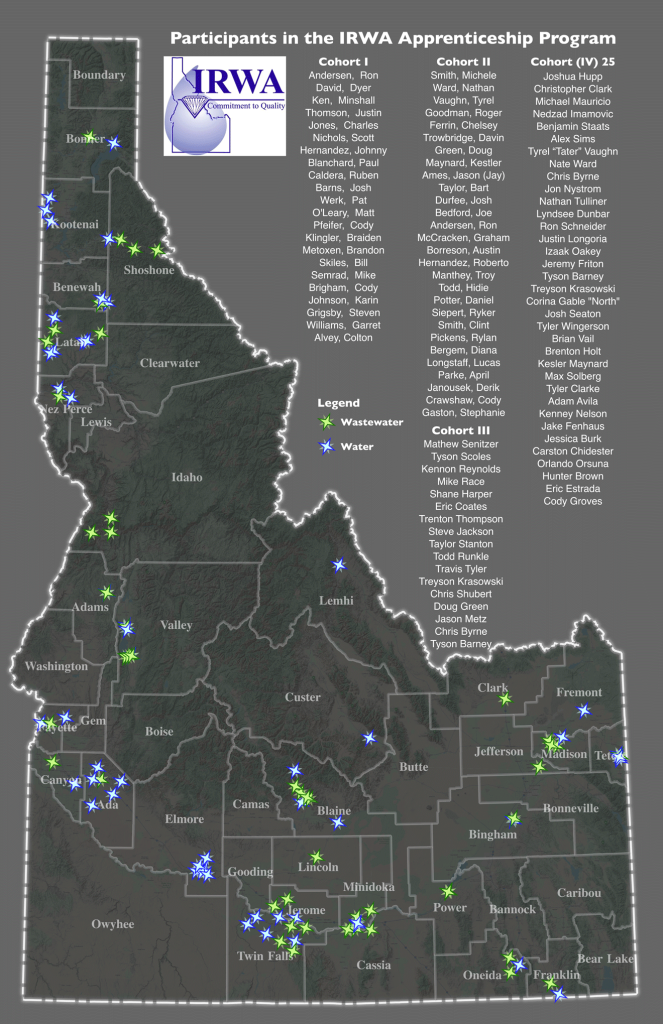
Gary Sievers, a professional trainer with the Idaho Rural Water Association (IRWA), remembers each of his apprentices by name and by city. “New Plymouth, Lapwai, Malad, Heyburn, Potlatch, Glenn’s Ferry…” He lists off the towns one by one. It’s clear from the way he speaks why he remembers them all – he lights up when describing his students’ successes. “For me, it’s thrilling in watching the trainings … when an individual is learning a concept and you can tell up to a point they’re struggling, and then you explain it a different way and the light bulb comes on. It opens their mind, and that is so rewarding to me.”
IRWA has provided training for 1,009 people since the beginning of their grant in 2020, exceeding their training goal to date by 269 individuals.
It all began with COVID-19. When the pandemic disrupted education around the state, IRWA’s CEO, Shelley Roberts, realized the organization needed to pivot its in-person training, and quickly. “Within about six weeks, we figured out how to deliver virtual training, even though it was very rudimentary. And pretty quickly we could see that this was going to be a paradigm shift, and virtual training wasn’t going to go away,” Shelley said. She and her partners applied for the WDTF grant to build out a new curriculum and create Gary’s position – a significant change for IRWA. Starting out with strong participant numbers, the program is now having a breakout year, with over 40 registered apprentices enrolled in the fall of 2023.
A big part of that jump is due to the goal that Shelley began with. “When Therese and Kelsie and I sat down and looked at the vision for this apprenticeship program, one of our key points was to create a paradigm shift to view the people in this industry as professionals, and not anything less than. Water and wastewater operators are true professionals and need to be compensated and treated respectfully as professionals.” IRWA walks the walk on this measure, and works hard to celebrate their trainees’ achievements when they receive a certificate.
“You stand up at the podium and you’re presenting this [certificate] to that individual, that city or district employee, and the council or board gives them a standing ovation and applauds them, and gives them accolades,” Gary says. “That’s exactly what we want the reaction to be.”
Additionally, IRWA had set aside some WDTF grant funds to discount tuition for communities under 10,000 people, making their training accessible for Idaho’s most rural residents and ensuring that location is no barrier to the achievement of top notch skills and quality jobs. Idaho LAUNCH has since stepped in to provide students funding and access to IRWA’s initial and professional development trainings, which are available in person, online, and in a hybrid format.
IRWA’s programs provide immediate benefits for Idahoans. According to Gary, many people who have previously struggled to take Idaho’s water system operator licensure test have passed with flying colors after the IRWA training program. The virtual services also make it easier for current professionals to participate in continuing education, and IRWA is already developing trainings for every level of licensure in the State, including those in management. This translates into increased skills, greater respect for our water systems operators, and improved safety and security for every Idaho community. Providing clean drinking water is essential for Idaho’s economy as well, allowing people to participate in work, tourism, and daily life safely and healthfully.
“We are producing better trained, better prepared, and more professional workers who can do that job,” Gary explained. “The training provides legitimacy for them.”
With enrollment numbers rising year after year, a pre-apprenticeship pilot program already taking off, and skilled and dedicated staff like Shelley and Gary driving the work forward, it’s clear that Idaho’s water systems are in good hands with IRWA’s trainers.
This project was funded with a WDTF Industry Sector Grant from the Idaho Workforce Development Council.


